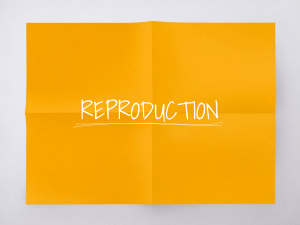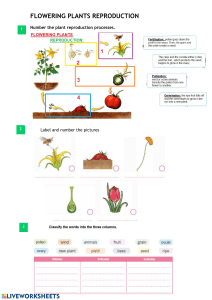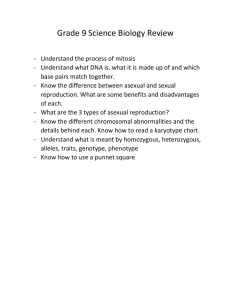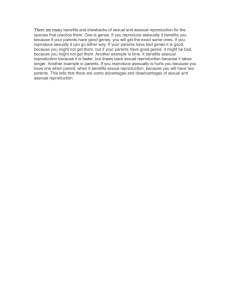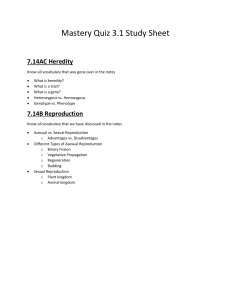Week 1 - 20 -24th - Types of Reproduction and Reproduction Behaviour
advertisement
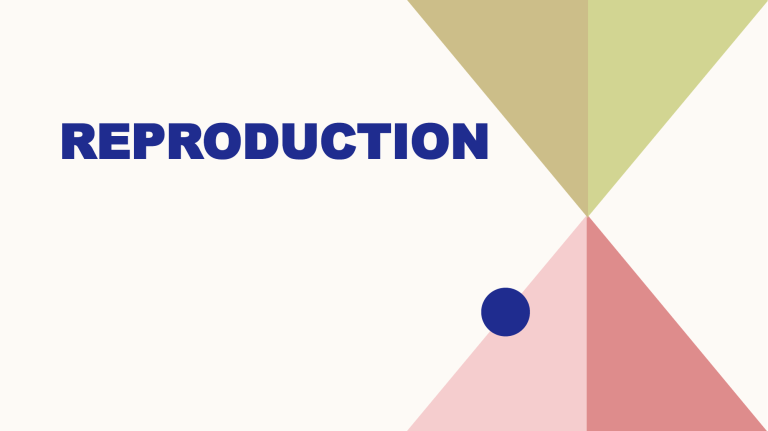
REPRODUCTION WHY DO WE REPRODUCE? All living things experience a drive to reproduce. But why? In pairs, think about why living things want to reproduce. 3 SO, WHY? • Well, in order to pass on our genes, then we need to reproduce. • If a species doesn’t reproduce, it will cease to exist! TYPES OF REPRODUCTION Not all reproduction requires a mate/ partner, all living species can reproduce on their own in some form. There are two types of reproduction. - Sexual (two organisms) - Asexual (one organism) TASK In pairs, answer the following: - Why might an animal reproduce asexually? - Why might an animal reproduce sexually? List the pros and cons of: - Asexual Reproduction - Sexual Reproduction ASEXUAL REPRODUCTION • Asexual Reproduction is when an organism reproduces itself simply by copying itself. • Mostly occurs in non-animal species like bacteria or nonflowering plants, but there are exceptions such as corals and seahorses. • Even these animals only do it as a back-up plan when a partner isn’t available/. • Mitosis is a form of asexual reproduction, too! 6 ASEXUAL REPRODUCTION: ADVANTAGES AND DISADVANTAGES 7 8 SEXUAL REPRODUCTION • The production of new organisms by the combination of genetic information of two individual of different sexes. SEXUAL REPRODUCTION : ADVANTAGES & DISADVANTAGES 9 Presentation title TASK 1. Complete the quiz on the pros and cons of asexual and sexual reproduction. https://wordwall.net/resource/52857133 10 11 MATING SYSTEMS Reproductive behaviour is largely affected by the mating system among the animals. There are two main categories of mating systems: 1. Monogamy = Each partner only has one mating partner. I.e., one male only mates with one female. 2. Polygamy = Each partner has more than one mating partner. I.e., one or more males mate with one or more females. WHY ONE OR THE OTHER? Monogamy- The reason for this is all down to what is more likely to benefit the offspring's chance of survival. If both parents are required for care, then they’re more likely to be monogamous. Polygamy - If resources e.g. food and water, are plentiful, the offspring may not need both the mother and the father to survive and so polygamy may be the better option. 12 TASK Look at the four pictures of the animals. Decide in your pairs which animals are monogamous and which are polygamous. Write your answers down and answer the following questions: - What is the role of the male in the relationship? - What is the role of the female in the relationship? - Why might this type of relationship work? 13 Presentation title 14 WERE YOU CORRECT? 15 Polygamous – Lions, Gorillas Monogamous – Penguins, Bald Eagles • Most species of penguins are monogamous, • Male lions will reproduce with many females. The females will look after one parent will go out to sea to catch fish for the offspring, as well as catch most their child, while the other parent will protect of the food. Male lions will patrol, their nest. mark, and guard territory. • Eagles will hibernate alone, but they will • In a group of gorillas, there is a return to the same mate year after year. dominant silverback which has its pick of the females. Often, other males in the group may not have a partner because of this. TYPES OF POLYGAMY 16
